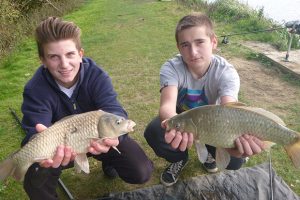Think back to any time you spent outside at school, and you’re most likely to recall a muddy sports field. At my school, one of the few times we were let loose into the surrounding countryside was when we took our Duke of Edinburgh’s award. Apart from that, the vast majority of our time was spent inside at our desks. Is that a good thing? The official curriculum might not factor in the great outdoors, but many schools have come to realise the benefits — both long-term and short-term — that being outside brings to their students.
Traditionally, private schools have led the way in teaching youngsters about the ways of the countryside. Many state schools, however, are now following their example. Take West Rise, a state junior school just outside Eastbourne. Its headmaster, Mike Fairclough, is very keen on ‘character-building’ — and believes that the best way to do this is by spending time in the great outdoors. A 120-acre wetland marsh which it leases from the council has become the focus of its outdoor curriculum. The school keeps a herd of water buffalo and a ‘bee sanctuary’ there, and the children are building a Bronze Age village. One day a year is dedicated to countryside management, including fly fishing, gun-dog training and clay-pigeon shooting, all with a focus on environmental sustainability. It’s not all fun and games, though — the Bronze Age village doubles up as a history classroom, and the school’s Key Stage 2 results are above average.
This might all seem slightly hippyish, but it doesn’t seem to cause any harm; in fact, the school has won a raft of awards for its outlook on education. The only people who seem to get upset are anti-gun campaigners, who argued that children shouldn’t be let loose with shotguns. But as Fairclough pointed out: ‘It’s about trust. We trust independent-school children everywhere to shoot at this age, so why do we not trust children at state-run schools?’ It’s a good point. After all, many independent schools, which are not under the government’s thumb in the same way as their state counterparts, have long been pushing the boundaries of health and safety. At The Elms prep school in Worcestershire, hunting is part of the curriculum. That’s not something you’ll see on most school timetables. But Sarah Austen, the classics teacher in charge of hunt activities, believes that hunting teaches children an awful lot. The responsibility of looking after yourself and your pony, of putting other consider-ations before your own (a vital lesson to learn when you’re cold to the bone during a wet January afternoon), respect for a farmer’s crops and property (that is, avoiding crops, closing gates and the importance of not galloping through a farmyard), as well as respect for one’s elders, and an understanding of the countryside and how it all works.
Hunting isn’t the only rural activity at The Elms. The school has its own farm, with cattle, sheep, chickens and pigs that the children learn to look after and show. The school’s farm animals and their produce are served up at meal times, too — teaching children an important lesson about where food comes from. After all, would you rather your own child goes through life mindlessly eating cheap chicken nuggets without a second thought, or that they understand the process and choose what they eat accordingly? You might think that children would be squeamish about this, but the fact that they chose to christen their Christmas turkeys ‘Brussels’ and ‘Sprout’ signals a no-nonsense attitude to the food on their plates.
It’s not all about the land, either. The ‘Fishing 4 Schools’ project, eight years old now, focuses on 11- and 12-year-olds who might not be doing particularly well at school, and encourages them to see how their education can be applied out in the world. Biology, maths, nutrition, even English are all subjects that can be applied to fishing. Weighing what you’ve caught, working out what weights you need to get a lure to sit at a certain depth — it takes the classroom to the river bank and vice-versa. The schools who have taken part all say it works. Charles Jardine, the angling expert behind it all, points to one example of a boy literally lured back to school after two years of absence by the prospect of a fishing trip. At Bower Grove — a state-funded special school in Maidstone, Kent — children with social, emotional and mental-health difficulties also visit the ‘Aquaculture’ department of nearby Hadlow College, giving them a taste of how their new fishing interest could be carried on into further education.

Proud boys with their Fishing4Schools catch.
One of the most important aspects of an outdoor education is making it available to everyone. Children from farming families already know where milk comes from and the children of hunt masters and followers already understand the responsibilities of the country-side. It’s more important and more rewarding to introduce that rural awareness to newcomers. Fishing 4 Schools is open to any school that might need its help, while farms everywhere encourage visitors. Even in London you can find places such as Hackney City Farm and Belmont Farm, Mill Hill. Simply learning where eggs come from might inspire a pupil to study for a BTec in agriculture or countryside management — and who knows where that might take them.
While any school might be able to organise a farm visit and learn where food comes from, only three have their own beagle packs: Radley, Eton and Stowe. A couple of others have close links to local packs. The very idea may sound like an old-fashioned public-school cliché; but beagling can be a surprisingly effective way of building up relationships with local communities. One former beagler told me: ‘Very few activities at school put you in touch with people from a different background — this was one of them.’ In the closed, village-like environment of boarding schools, this can only be a good thing. School beagling is also important in fostering new, younger members of the hunting community; Charles Carter, master and huntsman of the Middleton Hunt, and Otis Ferry, joint master of the South Shropshire Hunt, are two whose careers began in their school days.
So shouldn’t all schools be teaching their pupils about the ways of the countryside? The belief that this kind of teaching is a genuinely constructive addition to the curriculum, rather than simply a luxury, is becoming increasingly mainstream. Adding an outdoor element to teaching allows pupils to see other opportunities: that not all careers involve sitting behind a desk. And it nurtures other skills, such as self-confidence, responsibility, and self-discipline — all key life skills, no matter what career path you choose.
The post Field studies appeared first on The Spectator.
Got something to add? Join the discussion and comment below.
Get 10 issues for just $10
Subscribe to The Spectator Australia today for the next 10 magazine issues, plus full online access, for just $10.














Comments
Don't miss out
Join the conversation with other Spectator Australia readers. Subscribe to leave a comment.
SUBSCRIBEAlready a subscriber? Log in